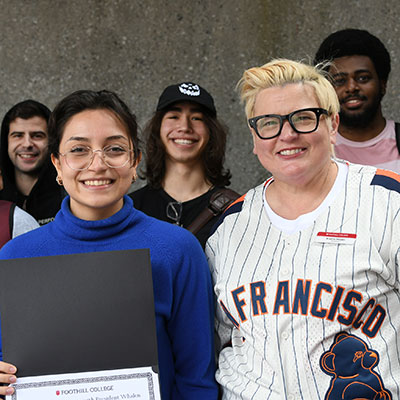
President's Office
May 10, 2024
1. Foothill Fiscal Forum.
As I send this newsletter, the Governor’s May Revise is being released and a $27.6 billion shortfall announced. In the coming days, the impact for California Community Colleges will be unpacked. Once done, and as a follow-up to the budget revision and the Chancellor's Budget Town Hall, I will be hosting a webinar forum on May 31st at 2 pm. Foothill College has a somewhat more complicated story to tell about the preparation for several years of plateaued funding. I invite the entire campus community to join and ask questions and stay informed.
2. Foothill College continues deep strategic planning.
Activities include:
- A draft of a new Vision Statement that will be circulated for campus feedback.
- Amplifying the request sent earlier this week, please share your thoughts.
The feedback form closes Friday, May 17. Acceptance and participation in the SEM (Strategic Enrollment Management) Program
A second visit from the State Chancellor Office’s Peer Resource Team for technical assistance on integrative planning and campus engagement
3. Best of the Best.
Foothill College has once again been voted the best community college in the Bay Area by the readers of Bay Area News Group's various media outlets!
4. Board Items of Note.
On Monday, several decisions were made that have implications for Foothill College.
First, the Measure G dollars designated for a large event center replacement (no longer
being built) were reallocated to the colleges. For Foothill, this means that the college
gained $20 million dollars to be used for campus Measure G priorities. In Winter quarter,
a subcommittee of the Facilities, Grounds, and Sustainability Committee prioritized
projects that were on the Measure G project list but unfunded. The expansion and renovation
of the dental hygiene facilities was the top ranked project, and the 20 million will
ostensibly cover the cost of that project.
Second, the Board approved the recommendation of the Chancellor to build, if funding
exists, employee housing on the Foothill Campus and student housing near the De Anza
campus. At the next Board meeting, funding models will be explored to see if both
projects can move forward.
5. Campus Climate.
In my written report to the Board, I noted that Foothill College has a committed group
of students, staff, and faculty that are activated around the tragic events in Gaza.
They are joining the growing consensus that the loss of civilian life is unacceptable
and the dire conditions for Palestinians require a ceasefire and urgent humanitarian
relief. Some students, faculty, and staff have joined advocacy, including organizing
the recent peaceful walkout on the Foothill campus, for broader geopolitical demands.
The leadership team has steadfastly protected free speech, but the rhetoric of these
other demands is straining relations on our campus and in our community.
It is for this reason that the college has consciously worked to engage students and
campus constituencies in constructive dialogue. I want to end 1-2-3-4-5 detailing
activity, some in the formative stages, addressing campus climate.
First, under the leadership of Dr. Laurie Scolari, an ad hoc committee of ASFC student
leaders are working to bring academically grounded programming on the Palestinian-Israeli
conflict to campus. Dr. Scolari has identified a noted equity scholar from USF that
will help identify speakers and programming rooted in deep scholarship. He would also
moderate the programming for the campus.
Second, The Office of the President is organizing, with support from the Offices of
Equity, Student Affairs, and Mental Health & Wellness, separate roundtables with Muslim
and Jewish identified students. These roundtables are designed as active listening
sessions aimed at identifying support for students that may find campus activism a
detriment to their studies and personal well being. The first of these roundtables
took place Monday.
Third, the Academic Senate is exploring, with other stakeholder groups, technical
assistance for conflictual relationships, perhaps using the Sustained Dialogue Institute–a provider of a reputable conflict resolution process. As its name implies, the aim
is to have on-going and intense support for the relationships among faculty. This
could also include other groups as well. This approach surfaced in the Presidential
Advisory on Social, Political and Civic Engagement by a faculty member. I am very
open to ways we can braid support for this important dialogue.
Fourth, the Office of Equity, led by Dr. Ajani Byrd, is working to source a book in
common from a noted UC Santa Barbara professor. The scholar’s New York Times bestseller “offers concrete skills for holding meaningful
conversations that cut across today's intense political divide.” The Scholar is also
being scheduled for a campus visit.
While we are not influencers in the geopolitical space, we can model responsible,
inclusive, and respectful dialogue on our campus. The Kalven Report is still a highly relevant guiding document, writing that higher education “ is the
home and sponsor of critics; it is not itself the critic. It is, [ . . . ] a community
of scholars.” We are working hard to preserve the collegiality that defines such a
community.
Yours in service,
Kristina

Questions?
Please Contact Us!
Dr. Kristina Whalen, President
650.949.7200
Administration Building 1900



